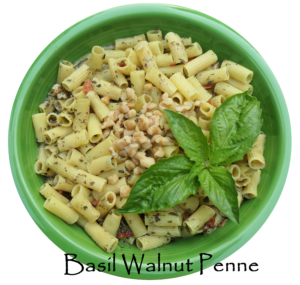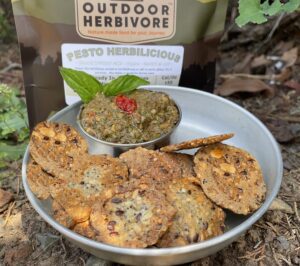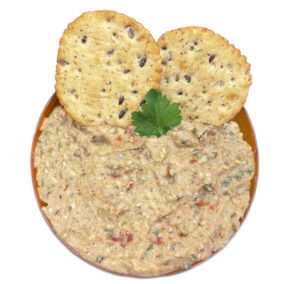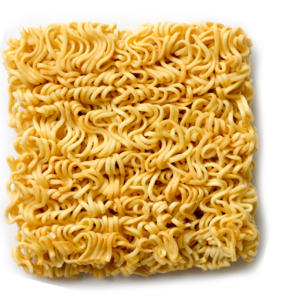Eating enough food is crucial to meeting the energy demands of endurance travel while maintaining overall health and well-being. Endurance marathons such as the annual 4 Deserts Race, a series of 250-kilometer (155-mile) races across four deserts, require competitors to carry their equipment and food.

Running in sandy terrain can burn approximately 500 calories per hour depending on your basal metabolic rate (BMR), pace, and weight. Accordingly, you will have a calorie deficit if you want to keep your pack weight light. For the 4 Deserts Race, which spans seven days, you must carry a minimum of 2,000 calories per day or 14,000 calories total. The best way to optimize your daily food intake is to pack only calorie-dense meals, snacks, electrolyte/smoothie mixes, and high-carb recovery drink mixes.
Packing Tips
To keep things simple and light, leave the portable backpacking stove at home. There’s no need for it. Drinking water is available at all checkpoints, and hot water is available at campsites. Save your hot meals for morning and night.
Avoid wet-packed foods altogether, as they add bulk and require extra calories to carry. The last thing you want is to exhaust your energy reserves and stress your joints by lugging around excess food weight.
Carefully plan your event menu by packing freeze-dried meals and ready-to-eat snacks that meet the high-calorie food definition.
High-Calorie Food Definition
Cal per 1 ounce (Kcal): 125 | Cal per 100 grams (Kcal): 441 | KJ per 100 grams (kJ): 1845
Starting Pack Weight Goal for 7 Days: Less than 20 lbs
A 3,000 daily food menu is a good compromise of calories and pack weight. By planning your food correctly, you can pack 3,000 calories per day with a food pack weight of 1.5 lbs (.68 kg) per day. That amount of food won’t cover your daily energy expenditure, but it will keep your food pack weight to a reasonable 10.5 pounds at the start of the race. This leaves you an 8-lb buffer for necessary gear such as your sleeping bag, clothing, and personal items, ensuring a balanced pack weight.
Here’s an example selection of dried foods at 6,000+ calories weighing under 3 lbs (1.3 kg) –
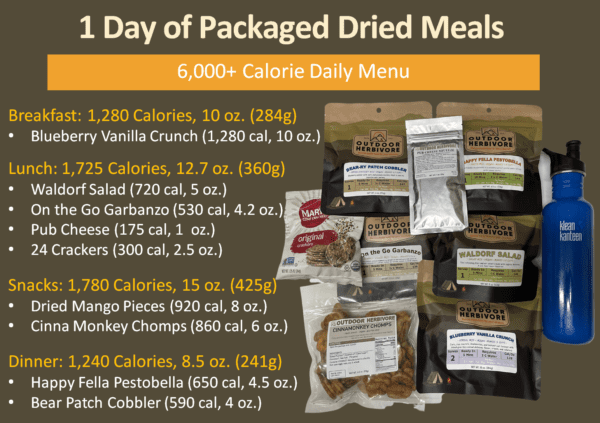
High Energy Density Food List
Fat, by weight, contains the most calories of any food. A single gram of fat, at 9 calories, has more than twice the amount of calories per gram as carbohydrates and protein at 4 calories per gram. The highest energy density foods are high in fat with low water content, such as nuts, seeds, and dried cheese. Consequently, your primary food sources must contain a high concentration of fat. We recommend adding fats to all your high-carb meals.
Boost the calories and flavor of all meals by including foods from the following list –
1. Plant Oils
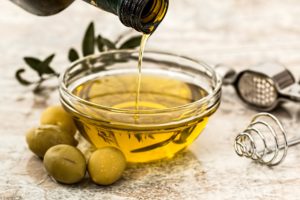
Fat is the most concentrated source of food energy and is necessary for the body to utilize vitamins. Fat protects the body’s organs from injury and insulates against shock and temperature changes. Also, fat helps keep you satisfied by slowing down the digestion process.
Add a squirt of olive oil to your meals to boost the calorie content and enhance the flavor. Carry a small travel container of oil or take along the single-serve packets. We recommend plant-based oils that are high in healthy monounsaturated fat.
Calorie Density of Plant Oils (Avocado / Canola / Olive Oil)
Per 100 gram: 883 cal (3692 kJ)
Per ounce: 250 cal (about 2 TB)
2. Nuts and Seeds
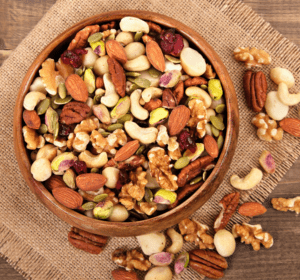
After pure fats and oils, nuts and seeds are the highest caloric-density foods we eat. They are high in unsaturated fat and offer a small amount of protein and fiber. Snack on mixed nuts and add them to cereals, pasta, and rice meals. The highest-calorie nut is the Macadamia.
Dry or oil-roasted nuts offer the most caloric density. Roasted nuts will be lighter, smaller, and crunchier because the roasting process evaporates the water from the kernel. Oil-roasted nuts have slightly more fat (calories) than dry-roasted or raw because of the added oil. Keep in mind that the nut roasting process can unfavorably alter nutrition. Depending on the roasting temperature and duration, antioxidants and healthy fats can be destroyed. Acrylamide, a known carcinogen, can be produced with heavy roasting. Dark roasted nuts have a much higher amount of acrylamide than lightly roasted nuts. If you are concerned with how nuts are commercially roasted, we suggest you get raw nuts and roast them yourself. To minimize vitamin loss and prevent acrylamide, roast nuts in the oven at less than 285 degrees F (140 C) for 15 minutes.
Calorie Density of Nuts (Varies). See the complete list.
Per 100 gram: 720 cal (3013 kJ) Macadamia (highest) to 491 cal (2053 kJ) Chia Seed (lowest)
Per ounce: 204 cal Macadamia (highest) to 139 cal Chia Seed (lowest)
Nut and Seed Butter are also good options. Nut butter adds creaminess and calories to oatmeal and pasta. They can also be used as a side or snack by spreading the nut butter on a tortilla or dense travel bread/cracker. Besides tortillas, dense crackers that are sturdy enough to stuff in your pack include crispy bread, pilot bread, and hardtack. Compressed barley cakes or rice cakes may also be an option.
As a dinner side or quick lunch, we like hummus powder (sesame tahini), pesto mix, and peanut butter powder spread on a tortilla. If you get powdered nut butters, make sure the fat has not been removed.
Calorie Density of Outdoor Herbivore Pesto Herbilicious Mix per 2.2 oz (65g) Pouch
Per 100 gram: 545 cal (2280 kJ)
Per ounce: 155 cal (makes 1/2 cup prepared pesto)
Calorie Density of Outdoor Herbivore Instant Hummus Powder Mix per 2.4 (68g) pouch
Per 100 gram: 470 cal (1966 kJ)
Per ounce: 138 (makes 1/2 cup prepared hummus)
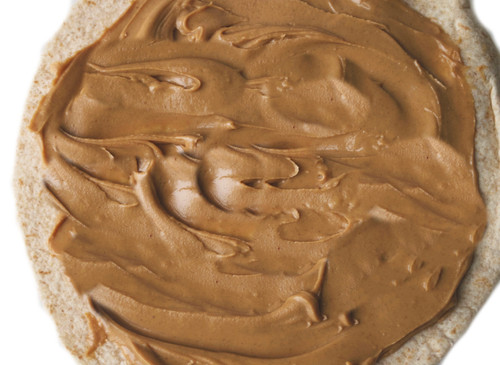
Calorie Density of Outdoor Herbivore Organic Peanut Butter Powder
Per 100 gram: 529 cal (2215 kJ)
Per ounce: 150 cal (makes 1/4 cup prepared peanut butter)
3. Coconut
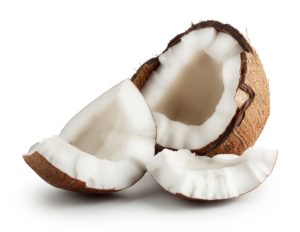 Dried shredded coconut will further boost the flavor and calorie profile of high-calorie cereals such as granola and muesli. For instance, this Blueberry Granola packs 640 kcal (2678 kJ) per serving and offers a good amount of iron due to the molasses. Coconut milk powder or Coconut cream powder is also excellent for enriching cereals, curries, noodles, and smoothie mixes.
Dried shredded coconut will further boost the flavor and calorie profile of high-calorie cereals such as granola and muesli. For instance, this Blueberry Granola packs 640 kcal (2678 kJ) per serving and offers a good amount of iron due to the molasses. Coconut milk powder or Coconut cream powder is also excellent for enriching cereals, curries, noodles, and smoothie mixes.
A simple high-endurance breakfast recipe: combine equal parts chia seeds, coconut shreds (or coconut cream powder), and dried fruits like dates, cranberries, and mango. Dried fruits are rich in simple carbohydrate sugars, primarily fructose and glucose, which the body quickly metabolizes and digests. Chia seed is an exceptional fuel for energy and provides extensive hydration due to its ability to absorb more than 12 times its weight in water. Chia seeds were a staple food for the Aztecs, who used them to sustain their energy during long-distance journeys.
Calorie density of Coconut
Per 100 gram: 660 cal (2762 kJ)
Per ounce: 187 calories (large handful)
4. Dark Chocolate
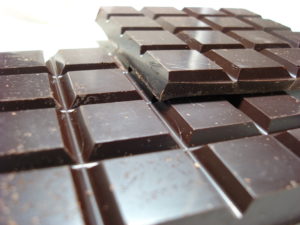
Chocolate is a favorite snack loaded with calories. Not all chocolate is durable for the desert or tropics! You’ll want the chocolate to remain solid in the heat but melt in your mouth. The best heat-resistant chocolate is non-dairy dark chocolate (70% cocoa or higher) with thick, dense cuts, not flat, thin, elongated bars. Milk chocolate and white chocolate is more likely to melt and turn into a gooey mess. In general, dark chocolate can resist melting up to 90 F/32 C and milk chocolate up to 84 F/29 C. Keep chocolate stored in the middle of your pack, away from your body heat. Consider adding dark chocolate pieces to nutty trail snack mixes or dark cocoa powder in chia puddings/drink mixes.
Calorie Density of Dark Chocolate
Per 100 gram: 600 cal (2511 kJ)
Per ounce: 170 cal (2 squares)
5. Dried Banana Chips
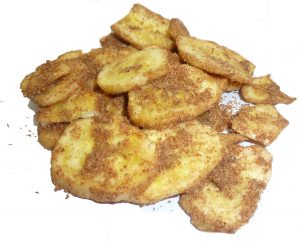
Most manufacturers bake or fry banana slices in coconut oil and added sugar to achieve a crunchy texture and sweet flavor, which means they are high in calories. Although this snack is not considered healthy, it is better than eating candy. Banana chips contain some nutrients, such as magnesium and potassium, to restore electrolytes after heavy sweating. Look for banana chips that do not contain artificial flavoring.
Calorie Density of Banana Chips (Coconut oil coated)
Per 100 gram: 501 cal (2097 kJ)
Per ounce: 142 cal (10 chips)
6. Tiger nuts (tuber)
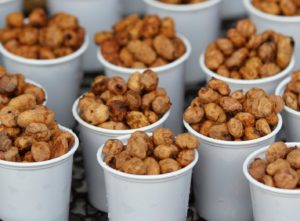
Tiger nuts, also known as nookon or chufa, are a root vegetable (tuber) native to Africa, which has been used as a primary energy source for millennia. The high content of starch makes it a great energy source for running. Tiger nuts have a sweet and slightly nutty flavor and are best when eaten peeled as a snack.
Calorie density of Tiger Nuts (Chufa)
Per 100 gram: 494 cal (2068 kJ)
Per ounce: 140 cal (handful)
7. Precooked Dried Beans (Chickpeas, Pinto, Edamame)
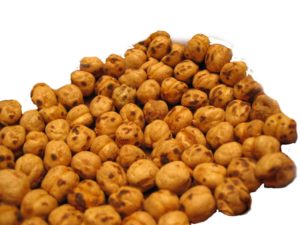
Overall, beans are a great source of protein, fiber, carbohydrates, and some are high in calories. Roasted chickpeas make an excellent high-calorie spicy or savory snack for runs. Add roasted chickpeas to pasta for a hearty and meatless meal. Hummus and crackers also make a nice high-calorie snack. Look for hummus powder mix. Dried bean flakes are another great choice. Instant Bean flakes will soften in cold or bot water in less than 10 minutes. Another good choice for a crispy and salty snack is roasted edamame. The more mature form of the edamame bean is soybean, which makes an excellent meat substitute (tofu) and dairy-free milk (soy milk).
Calorie Density of Cooked Roasted Edamame
Per 100 gram: 438 cal (1831 kJ)
Per ounce: 124 cal (handful)
8. Dried Oil-Cured Olives
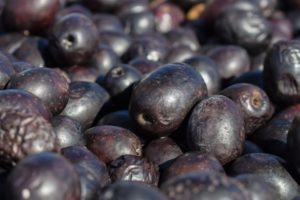
Olives are a remarkable source of antioxidant and anti-inflammatory phytonutrients and a good source of iron. Oil-cured dried olives are fatty and salty with a chewy texture. The olives aren’t really cured in oil; instead, they are cured in salt and then soaked in oil to make them plump.
When you’ve been sweating in the desert all day, dried olives will most certainly cure your salt cravings. Make sure you choose olives that have been pitted to avoid extra weight and waste. The most common oil-cured olive is the black Moroccan.
Calorie Density of Oil Cured Pitted Dry Olives
Per 100 gram: 438 cal (1831 kJ)
Per ounce: 124 calories
9. Fresh Avocado
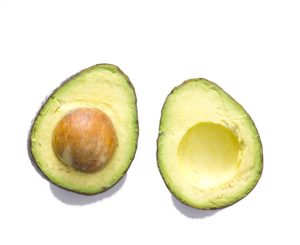
Fresh fruit seldom makes sense to pack for a race. It is calorie-light and water-heavy, plus it spoils and damages easily. The exception is the avocado. Avocados don’t contain much water, and the flesh is rich in healthy fat and nutrients. Clearly, packing fresh avocado only makes sense if you can get a ripe one at a local market before your race and can eat it within the first few days.
Prepare the avocado for storage in your pack: cut it in half (leave the skin on), remove the pit, rub the exposed flesh with lemon or lime juice (or a packet of true lemon/lime) to prevent browning, and secure the two halves back together with a rubber band or hair tie (nice, but not required), then place in a ziplock bag or aluminum foil. Keep it cushioned by clothing in your pack to prevent crushing. When you are ready to eat it, remove the rubber band, grab a spoon, and dig in! Sprinkle a packet of salt on the half for an electrolyte boost. You will not be disappointed.
Calorie Density of 1 Medium Avocado: 250 Calories
10. Dairy
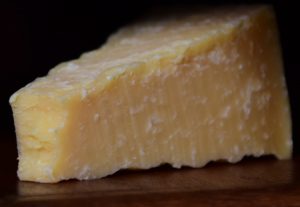
Dairy, commonly produced from a lactating cow, is intended to strengthen and enlarge a calf rapidly. Unsurprisingly, dairy (and its byproducts) contain a high amount of fat, calories, and nutrients. Yet, dairy also causes inflammation and bloating for many, plus there is the issue of animal welfare. You’ll have to decide if it makes sense. Although we’re not advocating dairy as food, it is ubiquitous worldwide as a source of food and comfort.
If you consume dairy, we suggest looking for backpacking meals made with organic whole milk powder, organic cheese powder, and organic butter powder. Ghee is another option to consider because it requires no refrigeration. Regarding cheese, certain flavors pack more calories than others: Gruyere, Parmesan, and Manchego. We do not recommend packing hard cheeses for races when the temperatures are hot unless you plan to consume them within the first day or two.
Calorie Density of Cheese Powder
Per 100 gram: 452 cal (1890 kJ)
Per ounce: 128 calories (1.5 TB)
11. Instant Noodles
One block (3oz 85 g) of prepared ramen noodles has about 380 calories. Ramen and other instant noodles are not nutritious, but you can add freeze-dried vegetables or a packet of Open Skay Yasai to make them a healthier meal. Outdoor Herbivore also carries organic pre-cooked pasta that requires only soaking in hot water for a few minutes.
Calorie Density of Ramen Noodles
Per 100 gram: 448 cal (1876 kJ)
Per ounce: 127 (one block)
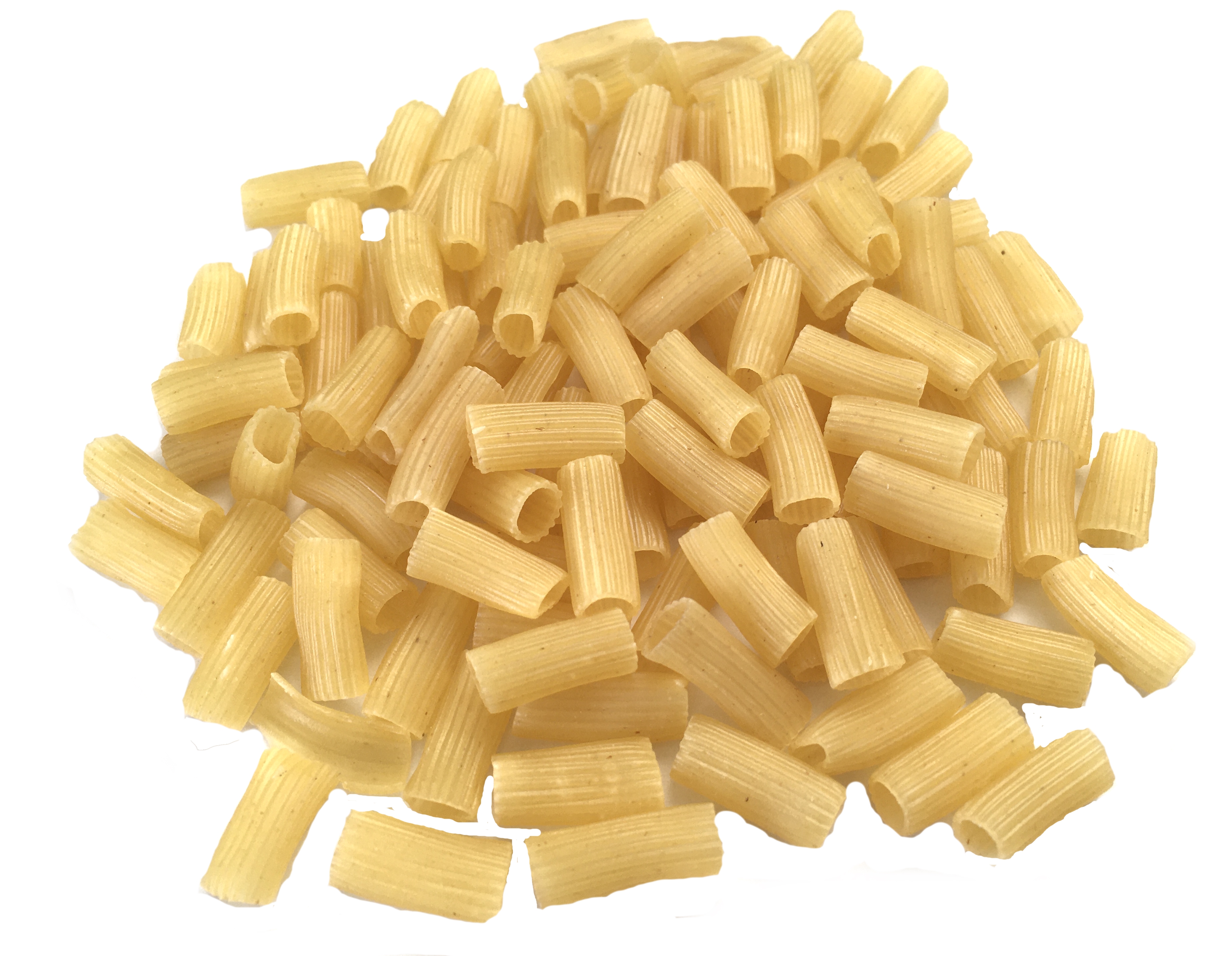
Calorie Density of Outdoor Herbivore Instant Penne
Per 100 gram: 371 cal ( 1552 kJ)
Per ounce: 105 cal (1 cup)
See the complete list of high-calorie foods.
Backpacking Meal Recommendations
Based on competitors that we’ve supported in the past, here are a few favorites that pack flavor and energy:
No-cook Meals (requires non-heated water)
Waldorf Salad is a refreshing fruit and walnut salad in a creamy dairy-free dressing that is simple and quick. Add water to the pouch, stir, and rehydrate for 5 minutes. A single meal pouch packs 720 calories (3012 kJ) at a weight of 5 ounces (142 grams) and 1440 calories (6024 kJ) for the double-size meal pouch. This cold-soak salad is loaded in fat, protein, and carbs.
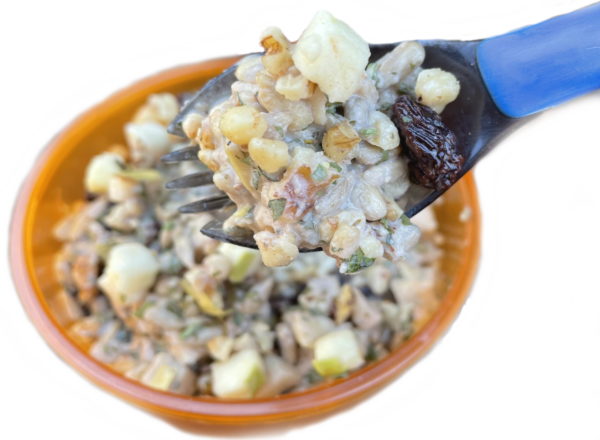
Lazy Lentil Salad is a hydrating salad mix featuring split lentils, sunflower seeds, freeze-dried organic apple chunks, and sweet cranberries in a zesty vinaigrette. It’s refreshing and fast to make: Open the pouch and add 1/2 cup of cool water, stir, and allow to hydrate for 5 minutes. A single meal pouch packs 540 calories (2259 kJ) at a weight of 4.4 ounces (125g) and a double size packs 1080 calories at 8.8 oz.
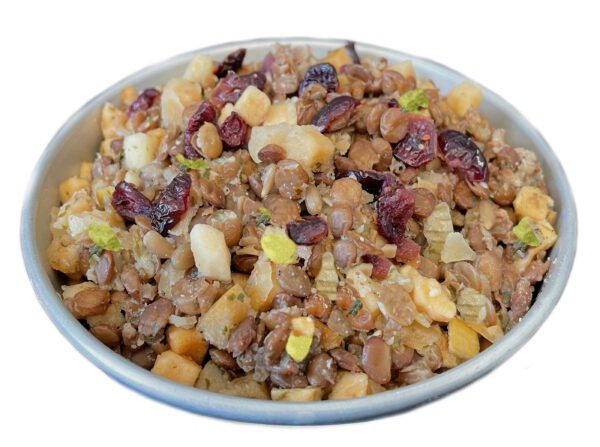
Hot Meals (requires heated water)
Bear Patch Cobbler is a delightful blueberry cobbler with walnuts, flax seed, and granola chunks makes a wonderful breakfast or recovery dessert. A single meal pouch packs 590 calories (2469 kJ) at a weight of 4 ounces (113g).
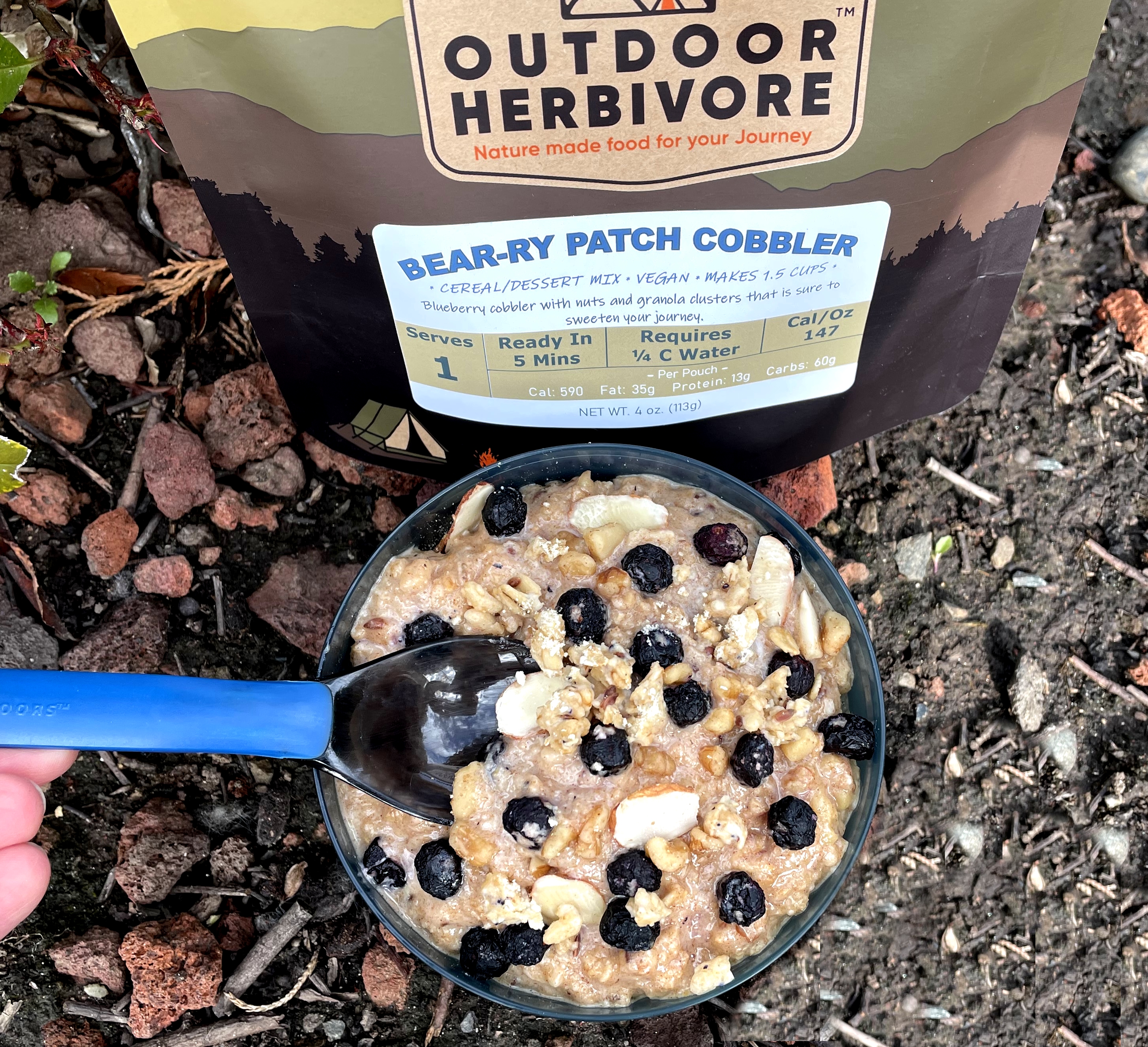
Happy Fella PestoBella is a savory vegan meal that features a walnut basil pesto sauce with penne pasta and portabella mushrooms. A single meal pouch packs 650 kcal (2720 kJ) at a weight of 4.5 ounces (128g) and a double serving packs 1300 calories per 9 oz.
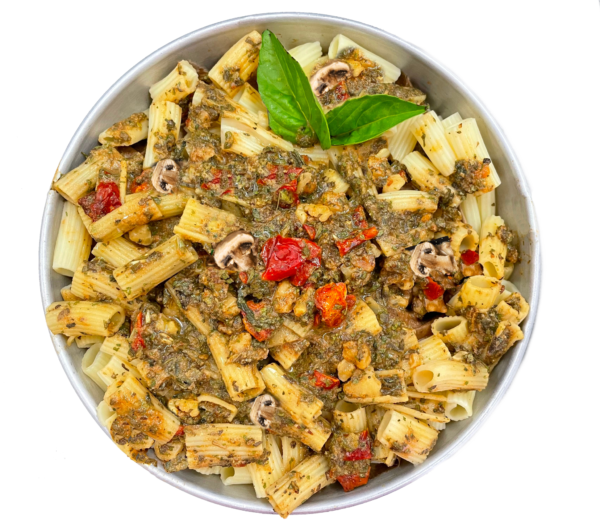
In Summary
Maximize your performance potential by properly packing a variety of high-energy foods that contain 125 calories or more per ounce, such as trail mixes, meal bars, freeze-dried meals, and powdered shakes. A reasonable food weight goal is to pack 1.5 lbs (.68 kg) of food per day at approximately 3,000 calories, while an absolute minimum food pack weight is 1 lb (.45 kg) per day or 2000 calories. See also Outdoor Herbivore Meals For Races and Competitions for more suggestions. Reach out if you need help with your meal planning.
More information about the 4 Deserts race:
The race series currently includes the Gobi March in China, the Atacama Crossing in Chile, the Sahara Race in Egypt, and The Last Desert in Antarctica. The fifth event changes to a new location each year.
4 Deserts series: 4deserts.com
RacingThePlanet: racingtheplanet.com
Related Posts:
About Outdoor Herbivore:
Produces real food for outdoor travel. Take us backpacking, bikepacking, paddling, motorcycling, sailing, horseback riding, RVing, air traveling, hoteling, yoga retreats, and more. Our specialty is vegetarian backpacking meals, but you don’t have to be a herbivore to fancy our food. Enhance your travel experience and taste buds with the addition of Outdoor Herbivore in your pack. Cheers to good health and joyful adventures.
